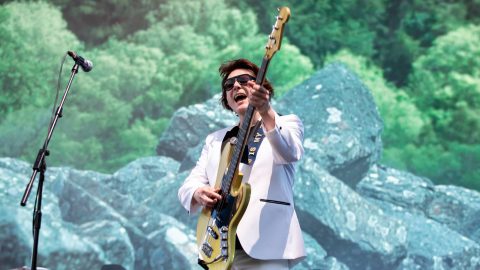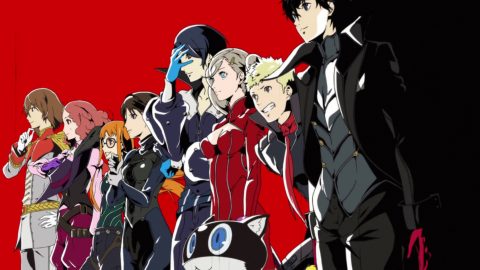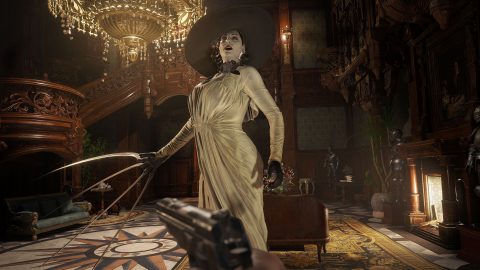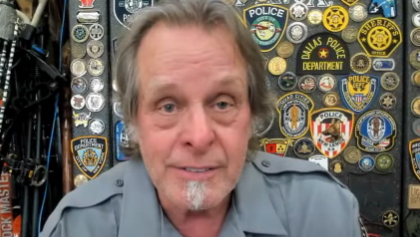
“I’m going for a drive. I don’t know where, I’m just taking the car and heading north. I need a few days to drive, so I can’t think about work,” Carlos Rodríguez says at the end of our interview. G2, Rodríguez’s esports team valued at $105 million, has just suffered its worst defeat in years. He’s moving to New York soon, away from his Berlin home, where the Spaniard currently lives. We’re interviewing him early in the morning after a routing defeat. He told us his wife just wishes he could, sometimes, “just be sorry something bad has happened” and move on. He’s got a lot going on.
“But I’m not like that, I can’t just move on: if something goes wrong, I need to learn from it. Understand why it happened and make sure it never happens again. I have learned more from the losses in my life than I ever have from the victories.”
Carlos ‘ocelot’ Rodríguez is a hyper-competitive man. In his past, it’s caused some issues – he’s said regrettable things in the heat of the moment – but he’s chilled out a little as he turned his deft hands from bodying opponents in League of Legends to owning one of the most prolific companies in the gaming sector. That spark that’s driven him to be one of the most successful esports players and businessmen in the esports industry has never gone away. “The last thing I wanted to do today is an interview, you know?” he laughs. “This is as sad as you’re going to find me, ever.”
After G2 suffered a surprise defeat at the hands of old rivals Fnatic at the League of Legends LEC 2021 Summer Playoffs, the admittedly hot-headed Rodríguez needed a time-out. Internally at G2, and in the esports community at large, this defeat was a surprise – the game should have been in the bag for G2. Some commentators have gone as far as to say this defeat marked the end of the G2 Esports era in Europe.

“It took me 10 minutes of pounding my head before I thought ‘OK, I need to rebuild’,” he explains when we ask him what happens next. “I can’t just sit there and be sorry we lost, no. I can’t fucking do it, I can’t do that. I don’t want to feel like I’m a victim or be cynical, you know? [The loss] is my fault. I learned a fucking lesson and moved on.”
But how does a man that was once one of the most successful (and controversial) esports players that made his name in League of Legends see himself after a defeat like this? A defeat – by the way – that no longer just impacts the prestige of the G2 esports team, but now the wider digital media company Rodríguez is heading up. A defeat in the early stages of the LEC 2021 Summer Playoffs isn’t just similar to FC Barcelona getting knocked out in the group stages, it could also be compared to a line of Disney merch getting pulled after one of the company’s actors did something inadvisable in public.
“You can clearly see just by looking at all our different IPs, looking at where our revenue comes from, just looking at how the company looks, that we’re a media company. We rely on content formats. We rely on social media presence. We rely on our brand being powerful, not only competitively speaking, but in its tone. I have made a comparison – saying that G2 is like Disney – before, and I think it’s a fair comparison. Obviously, that company is larger, but it won’t be larger in the future.”
There’s a confidence that could very easily be confused for arrogance in the way Rodríguez speaks. But it’s not arrogant; everything he’s saying is true. G2 is a behemoth in the world of esports (it attracted $17 million in investments in 2019 alone) and as it partners with more and more household brands and starts moving into more and more territories, you can see why the immediate comparison the athlete-cum-entrepeneur wants to make is with, of all the companies out there, Disney. But that’s not to say he’s forgetting his roots; Rodríguez’s passion is still in playing the esports game. It is, after all, where he cut his teeth.

“What we do, and where we came from, is competition. A part of my job consists in building the right line-ups, in the right games, before they become popular, so that I don’t have to break my bank before I become relevant in that game. A lot of what I do is instinctively guessing what people would like tomorrow, and using empathy to understand the audience and get the right players. Making sure I can find the right players and put them in the right line-ups, that’s very similar to traditional sports teams – and you’ll find that we’re very, very good at it.”
Leveraging these twin-headed sides of the company, Rodríguez intends to pilot a business powerhouse that’s completely outfitted for 2021 and beyond. G2 content had an average engagement rate of 10% in 2019 across its Instagram, Twitter, Facebook and other social accounts – that may not sound groundbreaking on its own, but compared to other global sports brands (Liverpool FC’s 1.15%, Manchester City FC’s 1.23% and The Boston Red Sox’s 1.78%), it’s clear that Rodríguez and G2 knows how to leverage its popularity, reach and prestige as the most-watched esports team in the world.
Interestingly, Rodríguez uses a Twilight analogy to explain his business mentality in getting a new audience into esports, and connecting with a whole new group of potential customers, and how being a media company and a sports team, in tandem, will shape the business going forward. “When I was about 18, I saw loads of cool people – girls, especially – driving Volvo cars. I was like ‘what’s going on? That’s a straight-up ugly car, why is everyone driving that?’ Later, I came to the realisation that Twilight – the movie Twilight – had Volvo as sponsor. So suddenly you saw Volvo everywhere… because the movie was this phenomenon. I sound like a boomer, but it’s true.
“All of a sudden Volvo became massive for young people. I feel the same way about [esports]: you want to be part of young people’s lives early on, and you want to educate them on your products and services. And what’s the best way to do that? By connecting emotionally.”

Rodríguez goes on to enthuse that the way we react to sports teams winning and losing is the ultimate emotional connection; in seeing a team we love come out triumphant, we pump our fists and shout in joy. In seeing them defeated, we echo their sorrow from across the country – or across the world. Loyalty and support, conceived in competitive environments, is almost primal.
“You want to have an emotional deep, emotional connection with your fans. I fail to identify a better emotional connection than the one that teams that compete have with their fans.” Given the context, the next few sentences from Rodríguez felt quite emotional. “When you lose, fans want to rip you off into pieces: they tell you which players you should get, the line-up changes you should make, all that.”
You may not think esports is as big as traditional sports, but in some ways the fledgling interactive entertainment format is nipping on the heels of the more established leagues. But G2 has seen partnerships with the likes of Adidas, Dominos, Red Bull, BMW, Logitech, Philips, Twitch and Mastercard. Rodríguez himself appears in as a subtle hologram on the Adidas kit his athletes wear – kits that have been designed in partnership with Adidas to light, absorbent and prevent performance-affecting sweat build-up during lengthy games of League of Legends, say. This growth, and the eagerness of major, mainstream brands to be involved with esports, is starting to filter down to street level, where that all-important emotional connection Rodríguez is chasing comes into its own even more.
“And when you win? Bro, everybody is happy. I’ve seen people outside waving G2 flags out of their cars when we won [League of Legends] MSI tournament in 2019. It was like it was the Football World Cup. I have videos on my phone of people driving past me [in Milan] waving G2 flags out their windows.”

Rodríguez tells us that as more traditional sports stagnate, the big, famously deep-pocketed brands are eyeing up G2 and other esports teams more and more. In Rodríguez’s own words, baseball “sucks, obviously”, football is “doing OK, but decelerating” and Formula 1 and “some others” are simply going strong. But importantly, they’re not growing – and they’re not growing at the rate that esports is, to boot.
“G2’s reach is about 31 million, and 80% of that audience is below 30, and the vast majority of them are very in sync with new technologies, right? They grew up playing video games, they grew up around tech, or they grew up around all these things. [Mastercard, Philips, Logitech] and the other brands, they want exposure and to entertain. And they want to compete. And those goals are in sync with us – and that’s in sync with what I’ve wanted since I was playing myself.”
Combining that reach, the desire to chase Disney’s successes, and to cement G2 as one of the most important sports teams – whether you’re talking esports or more traditional sports – is why Rodríguez is migrating across the Atlantic to the US. “Europe is far more focused on quality of product, in general, whereas North American is heavily focused on entertainment and the marketability of things. What I want to achieve is a combination of both, which no-one has done yet.” Here, when Rodriguez talks about product, he’s talking about the teams themselves, the players going out on stage to win matches.
Rodríguez argues that, across sports teams and media platforms in the US, you see teams that are very strong on the entertainment front, who are very strong with their marketing, that ultimately offer “very poor” products. And then, on the other hand, he sees European companies that have a very strong product “with no idea how to market it” and “who are not entertaining”.

“Now, G2 is sort of the first brand that sits somewhere in the middle, right?” he asks us. “And our expansion to North America aims to make the most of sitting in the middle. Of course I’m oversimplifying, but that’s our aim.”
There’s a lot going on for Rodríguez in the immediate future, then: he needs to rebuild G2, make things right in the competitive side of his company, whilst preparing for a complete transplant of his life to the other side of the globe. He needs to work out how to point his audience at new products, how to keep an eye on emerging, important games (like, maybe, Splitgate) and he needs to keep tabs on what both traditional sports broadcasts and esports streams are doing so he can better prepare himself for the fast-paced future of digital entertainment. He’s got a million plates to spin at once. But for now? He’s going for a drive.
“I’m going away from Berlin for a few days to reset mentally. I’m taking the car and driving north. I don’t fucking know where I’m going. I’m going by myself. When I’m driving I can’t work.”
Given everything we chatted about in this interview, it’s quite a fitting that Rodríguez is eager to just head off somewhere after such a catastrophic defeat, because if he’s learned anything in his life to date, it’s that no matter where he goes – and no matter how badly he’s been defeated – success and victory will follow him soon after.
Dom Peppiatt is a freelance journalist and regular contributor to NME.
The post G2’s Carlos Rodriguez: “Baseball sucks, football is decelerating, but we’re growing” appeared first on NME.








